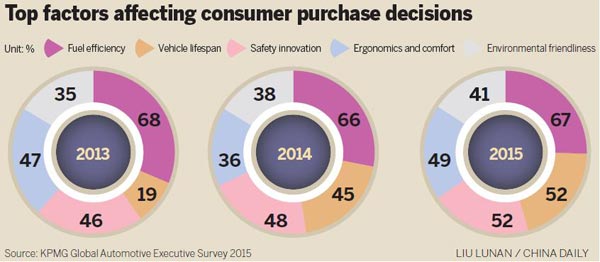![A child examines a car at an automobile show in Guangzhou, capital of Guangdong province in November,2013.[Photo/China Daily]](http://www.ecns.cn/business/2015/01-20/U468P886T1D151338F12DT20150120083129.jpg)
A child examines a car at an automobile show in Guangzhou, capital of Guangdong province in November,2013.[Photo/China Daily]

Liu Lunan/China Daily
Electric vehicles are expected to account for at least 11 percent of all the new vehicles sold in China in the next decade on the back of growing environmental awareness and stricter regulations, a new survey said on Monday。
The survey, published by global consultancy firm KPMG, showed that a majority of the Chinese respondents (68 percent) expect e-vehicle sales-hybrid, battery cell and fuel cell units-to account between 11 percent to 15 percent of markets in the next 10 years。
The survey was based on responses from 200 executives from automobile companies, suppliers, dealers, financial services providers, rental companies and mobility solutions providers in 31 countries, including 25 from China。
"The Chinese government and automotive industry have high hopes that e-vehicles usher a new era in the world's fastest-growing car market. Not content with catching up with more established players in traditional combustion engine technology, China is looking to leapfrog rivals to become the premier market for e-mobility," said Danny Le, partner and head of automotive at KPMG China。
Respondents from China ranked fuel efficiency as the top criterion for buying a car, with about 76 percent indicating it would be the main priority, far higher than the global average of 67 percent。
Rising air pollution in China, higher fuel costs, strict emission standards and rapid urbanization will ensure that the huge potential for electric cars is eventually realized, although this will require further innovation and disruption across the automotive ecosystem, and help from regulations and tax incentives, the KPMG report said。
By the end of last year, regulators had issued policies for supporting the development and application of new-energy vehicles between 2016 and 2020.
In Shanghai alone, more than 8,500 electric vehicles were sold by the end of November 2014.
Chang Xianghui, a Shanghai-based car dealer said: "Lower fuel costs and incentives are prompting many consumers to choose e-vehicles, as many consider long-term fuel costs while making purchases."
E-vehicle owners said they also expect companies to set up more charging stations and also provide better after-sales service。
Sun Taoli, an e-vehicle owner in Shanghai said: "I can find several charging stations in Shanghai. But sometimes when I travel to other provinces it is quite difficult to find such facilities."


















































